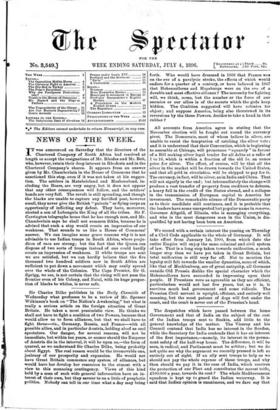NEWS OF THE WEEK.
IT was announced on Saturday that the directors of the Chartered Company of South Africa had resolved at length to accept the resignations of Mr. Rhodes and Mr. Beit, who, however, retain their deep interest in Rhodesia and in the Chartered Company's shares. It appears from an answer given by Mr. Chamberlain in the House of Commons that he sanctioned this step, even if it was not taken at his sugges- tion. The settlers in Matabeleland and Mashonaland, in- cluding the Boers, are very angry, but it does not appear that any other consequences will follow, and the settlers' hands are very full. The revolt is still spreading, and though the blacks are unable to capture any fortified post, however small, they never give the British " patrols " or flying corps an opportunity of inflicting any defeat. They have, moreover, elected a son of Lobengula the King of all the tribes. Sir F. Carrington telegraphs home that he has enough men, and Mr. Chamberlain says he shall not summon Sikhs, because he is advised that such a step would create an impression of our weakness. That sounds to us like a House of Commons' answer. We can imagine some grave reasons why it is not advisable to use Indian troops in South Africa, where preju- dices of race are strong; but the fact that the Queen can dispose of two sorts of troops instead of one could hardly create an impression of weakness. If white troops are sent we are satisfied, but we can hardly believe that the five thousand two hundred soldiers now in South Africa are sufficient to put down a movement which may easily spread over the whole of the Colonies. The Cape Premier, Sir G. Sprigg, we see, is not certain that the rising will not pass the frontier even of his Colony, and Natal, with its huge propor- tion of blacks to whites, is never safe.










































 Previous page
Previous page